Donald Trump
All topics-
 US election 2024
US election 2024What Trump's victory means for Iran
Donald Trump has won the US presidential election. Many Iranian opposition members hope that this will lead to the overthrow of the Islamic regime. But Trump's actions, especially in foreign policy, are not always predictable.
-
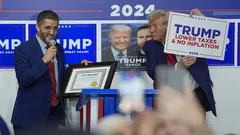 US election 2024
US election 2024Time to vote for Trump? How the Democrats are losing Arab voters
Arab-Muslim voters in the US are turning away from the Democrats because of their support for Israel. In Michigan, a Democratic mayor has even endorsed Trump. The US election may well be decided in this state, which is home to about 240,000 Muslims.
-
 Taliban Afghanistan 2 years on
Taliban Afghanistan 2 years onReport from a forgotten land
15 August 2023 marked the second anniversary of the Taliban's return to Afghanistan. Emran Feroz recently travelled through the country – here is his exclusive report for Qantara.de on everyday life in Kabul
-
 Exclusive: Egyptian activist Sanaa Seif
Exclusive: Egyptian activist Sanaa Seif"Egypt's regime must overcome its paranoia"
President Abdul Fattah Al-Sisi is driven by the fear of a new uprising, says activist Sanaa Seif. In interview, she talks about the fight to release her brother Alaa Abdel Fattah – and why the West should exert more pressure. Andrea Backhaus met up with her in London
-
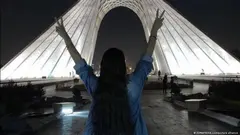 'Maximum pressure' gears up
'Maximum pressure' gears upProtests drive Iran's Saudi deal
On 10 March 2023, the world woke up to the breaking news that Middle East rivals Iran and Saudi Arabia had forged a deal to restore diplomatic relations within two months and refrain from interfering in each other's domestic affairs. Ali Fathollah-Nejad and Amin Naeni examine Iran's motivations
-
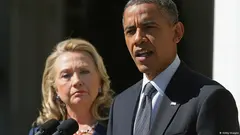 America’s partisan war
America’s partisan warBenghazi 9/11 casts a long shadow
Cries of "Benghazi!" still resonate across the USA ten years after a deadly terrorist attack in Libya killed the U.S. ambassador and three other Americans. Ethan Chorin re-tells Benghazi as a watershed moment, one that has helped create today's America: polarised, fearful and dangerously unstable. Sherif Dhaimish read the book
-
 The war in Syria
The war in SyriaOvershadowed, yet still a major issue
The Syrian conflict remains insoluble for the time being. Yet Europe could start managing it better. By reorganising humanitarian aid supplies, becoming more involved in the northeast and coordinating initiatives in the northwest, it could alleviate hardship, counter extremism and bring hope, writes Kristin Helberg
-
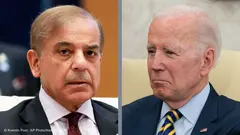 Geopolitics and jihadism
Geopolitics and jihadismBiden’s dangerous embrace of Pakistan
The Biden administration could have used Pakistan’s economic crisis to compel the country to sever its longstanding ties to terrorist groups. Instead, the U.S. protects and rewards it, putting short-term geopolitical considerations ahead of long-term interests. Commentary by Indian analyst Brahma Chellaney
-
 One year of Taliban rule
One year of Taliban ruleHow life has changed for Afghans
On 15 August 2021 the Taliban overthrew the government in Afghanistan and seized power. One year later, the country is facing multiple challenges that demand immediate global attention. Ahmad Hakimi reports
-
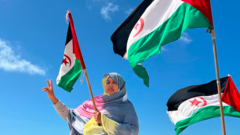 Western Sahara conflict
Western Sahara conflict"One day we will be free"
Sultana Khaya, 41, has been peacefully resisting the Moroccan occupation of Western Sahara for many years. Because of her campaign to assert the self-determination of the Sahrawi people, she was assaulted and raped. She has been under house arrest for over a year. Interview by Elisa Rheinheimer
-
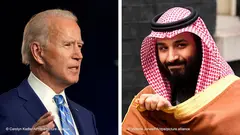 Saudia Arabia and the UAE
Saudia Arabia and the UAEGetting Washington wrong
Analyst Iyad El-Baghdadi examines the ongoing tensions between the United States and the two Gulf states – Saudi Arabia and the UAE – and their geopolitical implications in interview with Rayyan Al-Shawaf
-
 UAE's Mohammed bin Zayed al-Nahyan
UAE's Mohammed bin Zayed al-NahyanIran and Islamists a threat to Gulf safe haven
United Arab Emirates strongman Sheikh Mohammed bin Zayed al-Nahyan, who was formally elected president on 14 May, has led a realignment of the Middle East, creating a new anti-Iran axis with Israel while fighting a rising tide of political Islam in the region